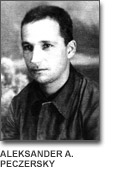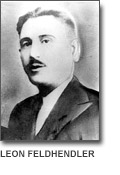|
| ||||||||
|


October 14, 1943 was a warm, sunny day and nothing disrupted the routine. Only a very small group knew that this was to be the fateful day. The Nazis in the camp went about their business as usual. At precisely 4:00 P.M., the stage was set. Everything now depended on the nerves of the attackers, their faith in themselves and luck.
Acting commander SS Untersturmfuehrer Niemann rode up on his horse and entered the tailor shop. Mundek was ready, holding the new uniform. The German without suspicion, unhooked his belt with its pistol in the holster and causally threw it on the table.
As tailors have done for ages, he patted and turned Niemann at his will. Finally he told him to stand still while he marked the alterations with a crayon. Then the blow fell. The Nazi dropped like a fallen tree, his head split. Shubayev rushed to Sasha's quarters and delivered the first pistol. They embraced. Now, there was no turning back.
At 4:l5, Oberscharfuehrer Graetschus, the German in charge of the Ukrainian guards, arrived at the cobblers' shop to pick up his order. While Yitzhak held the Nazi's leg in a firm grip, pretending to pull the boots, Arcady Wajspaper and Siemion Rosenfeld slipped out from the back room and split the skull of the Nazi with the ax. Then his deputy, the Ukrainian Klatt, entered, calling his boss to the telephone. He too was attacked and killed.

In Lager II, Toivi (Thomas Blatt) standing at attention was informing a SS Untersturmfuehrer that a new leather coat, exactly his size had been set aside for him in the warehouse. The German took the bait and went without hesitation in the direction of the warehouse.
Meanwhile, in one of the many partitions of the warehouse, a few conspirators were stocking packets against the wall, each containing ten articles of clothing. At the side lay the bait: a shiny, black leather coat. Wolf entered. "Attention!", barked Bunio. The prisoners froze. "Help the Herr Unterscharfuehrer with the coat!", ordered the Kapo. An inmate fetched the coat and held it for the German. The Nazi put his arm into the sleeves and in a split second the scenario changed. Held as if in a straight jacket, he could not move his arms. A strike of the ax by Cybulski and he fell. The executions in Lager II had begun: the trap was waiting for the next Nazi.
The conspirators went out to summon other Nazis and when the miners' carts with food rations were en route to Lager III, SS Unterscharfuehrer Valaster, the driver, was flagged down and told that Wolf urgently needed him. He left to be killed.
Another team readied for a new attack on SS Oberscharfuehrer Beckman. The prisoner Pozycki knocked at his office door asking permission to enter for some job clarification. Permission granted, they entered. Immediately, Pozycki immobilized him by a headlock and he was knifed to death. In the adjoining room, SS Scharfuehrer Valaster's body was lying on the floor.
Unexpectedly, SS Unterscharfuehrer Walter Ryba had wandered into the car garage in the garrison area where he was killed.
From the main tower in the center of Lager II came the sound of a bugle announcing the end of the day's work. As groups returned to the main square in Lager I, the marching songs in Yiddish, German, Polish, Dutch, Ukrainian and Russian echoed far beyond the barbed wires of the Sobibor forest.
Everything appeared like any other day. In Lager I, a mass of prisoners unaware of what was about to happen stood in line for their "coffee" and bread as they did every day. Their life or death would be determined in a matter of minutes.
At that moment, SS Frederick Gaulich entered the area. The prisoner Leitman immediately asked him to come to the newly built barrack because of some problem with the bunks. The moment Gaulich entered the barrack his fate was sealed; he was killed with an ax.
The first dead German was discovered. Returning from Chelm, SS Bauer, drove to the garment warehouse with two prisoners, Jakob Biskubicz and David. While unloading cases of vodka from the truck, one guard looked into the office and noticed a dead German.
Jakob Biskubicz describes how this discovery initiated the third phase of the revolt:
"A Ukrainian came running and called to Bauer, 'A German is dead!' Bauer did not immediately understand what he meant. But David also who heard him, started to run in the direction of Lager I. Bauer ran after him and shot at him twice. I remained alone."
Sasha, heard the gunfire and understood that something bad had happened. On Sasha's orders, Pozycki blew his whistle for roll call. Although it was fifteen minutes early, the Kapo's authority was never disputed and the prisoners began to gather.
Now the news spread like a wildfire. Some Jews were returning to their barracks where they pulled out their white prayer shawls from their hiding places and came out assembling near the kitchen reciting "Kaddish"; the prayer for the dead, for themselves.
Sasha, jumping up on a table, made a short speech in Russian, his native language. His voice was clear and loud so that everybody could hear, but also composed and slow. He told the prisoners that most of the Germans in the camp had been killed. There was no turning back. A terrible war was ravaging the world and each prisoner was part of that struggle. He promised that dead or alive, they would be avenged and so would the tragedy of all humanity. He repeated twice that those prisoners who, by some miracle survive, should forever be a witness to this crime. He ended with a call: "Forward Comrades! Death for the fascist!!!"
The prisoners from various countries, speaking diverse languages, understood. From the midst of the assembled Jews a single, strange and impatient voice was heard: "FORWARD! HURRAH! HURRAH!" In a flash, the entire camp burst with the defiant call.
Thomas Blatt recounted: "The remaining Germans: Bauer, Richter, Frenzel, Wendland and some guards with machine guns, who had initially been in shock, now effectively blocked the main gate. People were killed and the front line Jews mostly unarmed fell back, then a new wave of determined fighters pushed again forward towards in a suicidal thrust.
Someone was trying to cut an opening in the fence with a shovel. Within minutes, more Jews arrived. Not waiting in line to go through the opening under the hail of fire, they climbed the fence. Though we had planned to touch the mines off with bricks and wood, we did not do it. We couldn't wait; we preferred sudden death to a moment more in that hell.
Corpses were everywhere. The noise of rifles, exploding mines, grenades and the chatter of machine guns assaulted the ears. The Nazis shot from a distance while in our hands were only primitive knives and hatchets.
We ran through the exploded mine field holes, jumped over a single wire marking the end of the mine fields and we were outside the camp. Now to make it to the woods ahead of us. It was so close. I fell several times, each time thinking I was hit. And each time I got up and ran further...100 yards...50 yards... 20 more yards...and the forest at last. Behind us, blood and ashes. In the grayness of the approaching evening, the towers' machine guns shot their last victims."